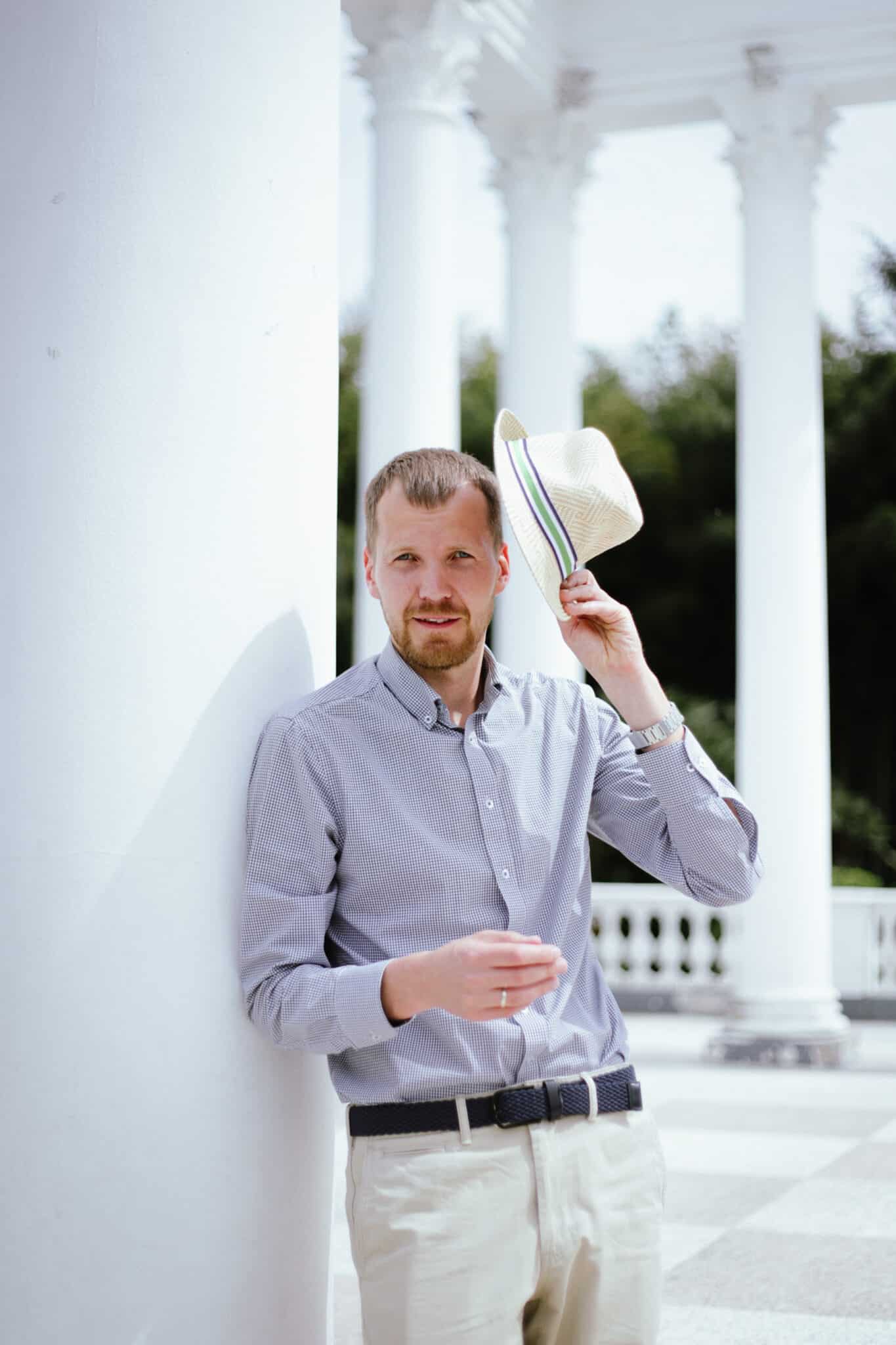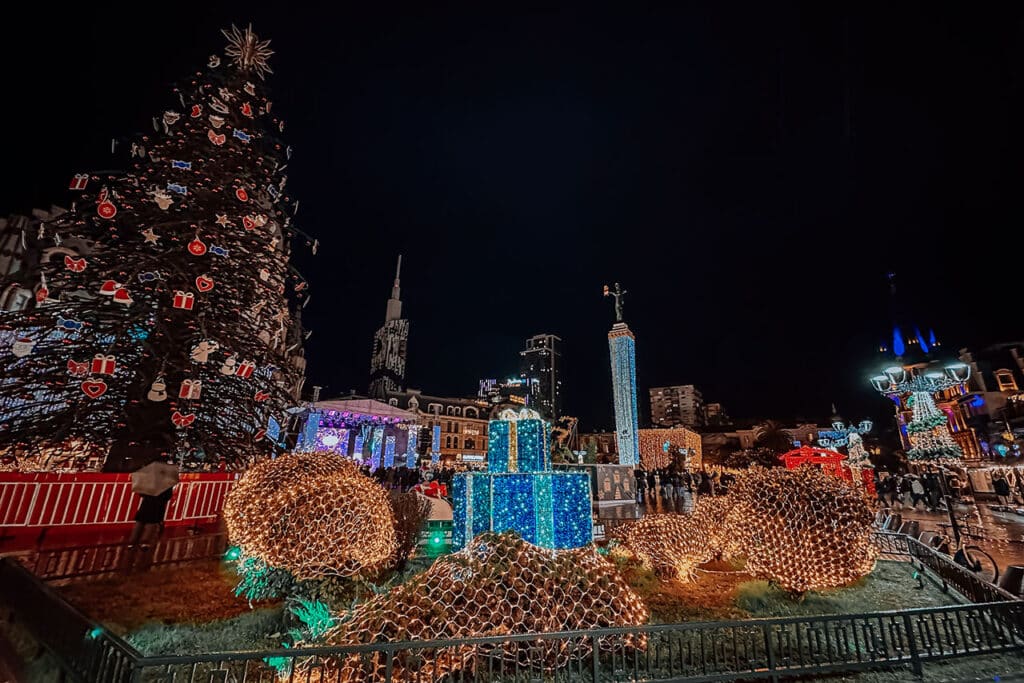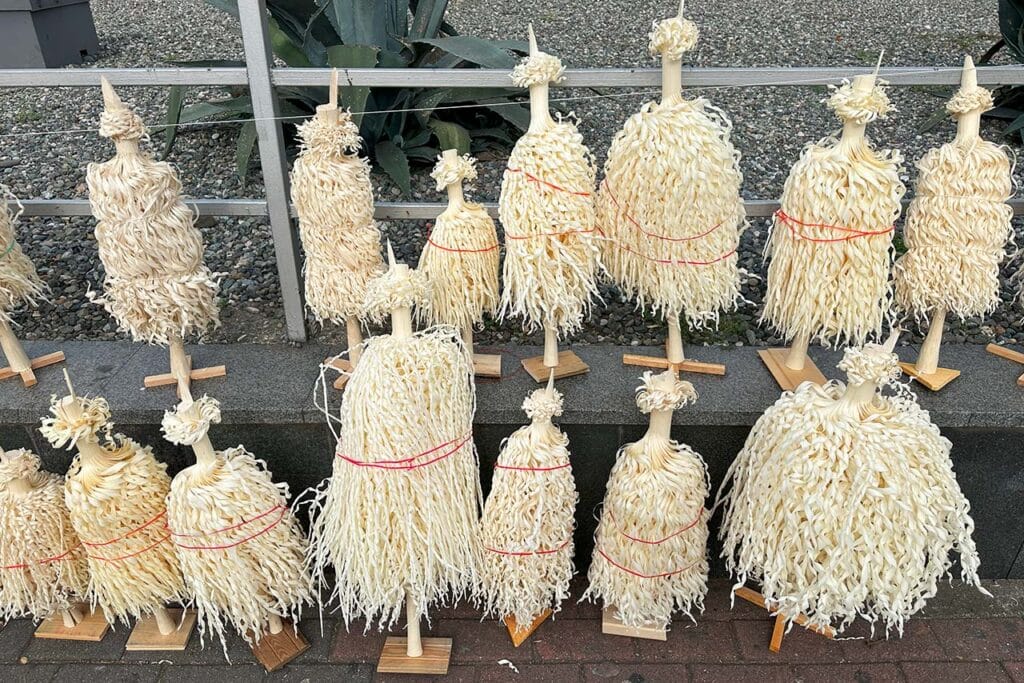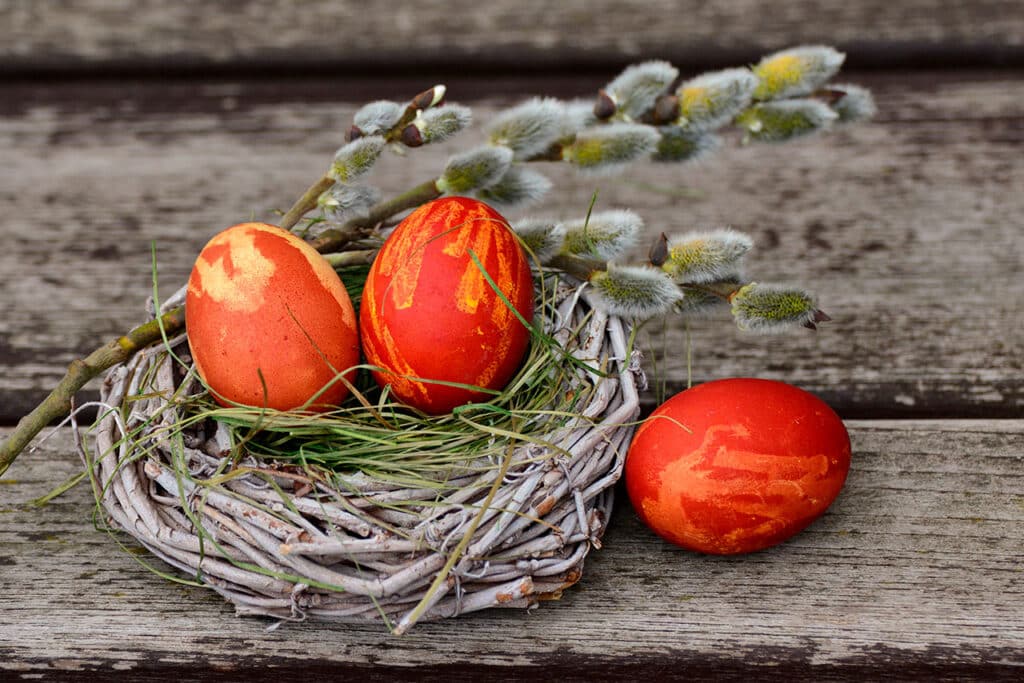National Holidays of Georgia
As you know, Georgia is a country of eternal celebration. Locals love to celebrate and have fun thoroughly, with music and dancing, traditional songs, and, of course, a huge amount of delicious national food.
On what holidays are government organizations closed? What unique customs are there in Georgian culture? What holiday national dishes are definitely worth trying? You will also learn a full list of all holidays and much more from this article.
New Year – January 1st
The Georgian New Year (Akhali Tseli) is very different from the holiday we are used to.
Take, for example, the well-known Santa Claus. Here he is called “Tovlis Babua” or “Tovlis Papa”, which means “Snow Grandfather”. But he really is snowy – in a traditional Caucasian hat and a white burka, with a dagger tucked into his belt. But his weapon is not dangerous, just a tribute to national traditions – it is not proper for such a stately man to walk around without a dagger. He delivers gifts to children on his own, without a retinue of snow maidens, deer and elves. He carries toys and all kinds of sweets for the children in his “khurdzhini” bag.
The second distinctive feature is the Georgian “chichilaki” Christmas tree. It is made from dried hazelnut branches, which are planed with a knife from the bottom up, without cutting the stripes to the end. This way you get a curly light tree, the main symbol of the celebration. It is decorated with fruits, which symbolize fertility in the new year, and sweets, which will certainly bring happiness. The tree itself is a symbol of life. In the period between Christmas and Epiphany, the tree must be burned to leave all the troubles and failures of the past year. Now in Georgian families for the New Year they put up both chichilaki and the usual spruce, decorated with toys and garlands.
On New Year’s Eve, a traditional drinking song is always performed “Mravalzhamier”. The polyphony of singing can be heard everywhere: at the family table, in church, in the central square – wherever the arrival of the New Year has caught you.
The obligatory attributes are a lot of wine and chacha, as well as a festive table bursting with food. The most important dish that should definitely be on the table is satsivi (chicken in a delicate nut sauce). Everything else is up to the family’s taste preferences, but most often you can find eggplants with nuts and pomegranate, pkhali, khachapuri, lobiani, cheese slices, churchkhela.
Old Tbilisi is decorated most magnificently for the New Year. Garlands and decorated Christmas trees sparkle on every street, and Shota Rustaveli Avenue turns into a magical fairy tale. The main Christmas tree is located near the parliament, and a whole Christmas village opens on Orbeliani with gingerbread houses, animators and a themed food court. Everywhere smells of spicy mulled wine and Cinnabons.
Bedoba – January 2
Bedoba comes from the Georgian word for “destiny” and is considered prophetic. This day should definitely be celebrated in the best possible way, because what it was, so will the whole year be. People try to dress in their best clothes so that in the New Year they will always be able to afford good clothes. It is absolutely unacceptable to swear, cry, or get upset.
There is a rule of the first visitor or “Mekvle”: the person who first enters the house in the New Year determines the fate for the coming year. It is he who influences whether the year will be lucky and successful or penniless and bad. Locals like to outwit fate a little and invite someone who, in their opinion, is a guaranteed talisman of well-being. Being “Mekvle” is extremely prestigious, since you are considered a lucky person. If you are invited to be such a guest on January 2, then bring the hosts some treats, for example, sausage, wine, candy.
Christmas – January 7, Alilo Festival
Christmas (Shoba) is one of the most important church dates, so it is celebrated in Georgia with great fanfare. In Tbilisi’s Sameba Cathedral, the country’s main patriarch Ilia II holds the main liturgy. Don’t be upset if you are not in Tbilisi at this time – festive services are held throughout the country. After the service, children go caroling, for which they receive gifts from the hosts of the house.
On the morning of January 7, the entire city flocks to the “Alilo” procession. Children are the heralds of the birth of the baby Jesus; they are dressed as angels and sent to march in front of the crowd. At the parade, they sing cheerful Christmas songs, dance and play musical instruments. During the procession, generous donations of money, toys and sweets are collected, which are sent to an orphanage at the end of the event.
Querci (Christmas cakes), sweet pastries called kadu, shashlik and all sorts of other meat treats, chiri (dried fruits), and red wine are placed on the table.
Epiphany – January 19
Epiphany (Natlisgeba) is another important religious holiday. Liturgies and blessing of water are held in every church in the country. Afterwards, a mass baptism of babies is held in Tbilisi’s Sameba by the country’s main patriarch, Ilia II. Parents dream of having their child baptized by him, because it is extremely prestigious.
On January 19, they visit their godfathers and godmothers; they stock up on holy water, which is considered healing.
Mother’s Day – March 3
Mother’s Day is a holiday that appeared quite recently, in the early 90s, but has managed to take root in the culture. The authorities planned to replace March 8 with this day, but in the end both dates took root. In the end, it was decided to leave 2 women’s days.
On March 3, children and spouses remind their mothers how much they love and appreciate them, give gifts, spend time with their families. In Georgia, the cult of mother is sacred, the keepers of the hearth are incredibly revered and respected. It is also symbolic that the event is celebrated at the very beginning of spring, when everything around wakes up, and nature begins to riot in lush color.
International Women’s Day – March 8
International Women’s Day follows immediately after Mother’s Day and brings another avalanche of bouquets, smiles and emotions. Now all women are congratulated, given all sorts of presents, and flower sellers happily count their profits.
In the evening, they set the table, where they read lush toasts to their mothers, sisters, aunts, grandmothers, once again uttering words of love and gratitude.
National Unity Day – April 9
April 9 was the precursor to Georgia’s independence and exit from the Soviet Union. On this date in 1989, Georgian citizens came out to the central Shota Rustaveli Avenue for a peaceful rally. They were dispersed by troops and special forces, killing 21 people and wounding 200 more. A memorial was erected in their honor near the parliament, where flowers are brought every year and the sacrifice of the freedom fighters is honored.
People try to spend April 9 with their loved ones, in order to emphasize national strength and unity. It is a non-working day in Georgia.
Good Friday
On the penultimate day of the fast, they try to abstain from food completely, except for water and bread. In Tbilisi Sameba, services are held, after which the shroud is brought out, which remains in full view of the parishioners for another 3 days.
Holy Saturday
Finally, when Lent ends, people start Easter chores: they paint eggs and bake paskhas. By the way, it is interesting that you will not find any sprinkles or white glaze on top of the festive pastry, at most a little powdered sugar. It is also not customary to use stickers and food coloring for eggs – in Georgia they are painted only with onion peel.
Easter – the main church holiday
Easter or “Akhdgoma” is the main religious holiday. On Easter morning, a competition takes place between family members and neighbors: they choose the strongest, in their opinion, painted egg and knock it against their opponent. When someone’s egg breaks, it is given to the winner.
In addition to this tradition, each region of Georgia has its own Easter competition. For example, in the West they play “lelo burti” (throwing a 16-kilogram ball to each other), and in mountain villages they compete in archery.
Sprouted shoots of the “jejili” grass are placed on the Easter table, which bring with them a harvest and new life. The seeds are sown on cotton wool or a napkin during Palm Week – the main thing here is to calculate so that they have time to sprout before the celebration.
On Easter night, baskets with food are blessed, a church service and a religious procession take place.
Easter Monday
It is the day after Easter, when people remember their deceased relatives. On Easter Monday, people visit cemeteries and bring Easter food to treat their departed loved ones. It is customary to drink a glass of wine at the grave and thus “have a feast” with the deceased, to show them that they are remembered.
The Great Victory Day – May 9
May 9 is the solemn date of the victory over the Nazi German army. A concert is held in Tbilisi’s Vake Park, where the great feat of the people of that time is honored. They are thanked with honors for the freedom of the country and wished good health. A parade of military glory is held with a march of troops and military equipment. Relatives visit the graves of participants in the Great Patriotic War, lay flowers on them. In other cities, the celebrations are more modest, but they also celebrate this holiday.
Day of St. Apostle Andrew the First-Called
St. Andrew the First-Called Day is celebrated twice: on May 12, a public holiday (day off) and on December 13, no day off. Both days are dedicated to the Apostle Andrew, who was the first to come to the lands of Georgia to spread Christianity. Andrew is the patron saint of couples in love and family well-being.
The official holiday of Georgia’s Independence Day is May 26
On March 31, 1991, Georgia left the USSR. But why then is it celebrated in May? Namely because on May 26, 1918, a decree was signed on the creation of an independent state of Georgia after a short stay as part of the Caucasian Republic with Armenia and Azerbaijan. The union lasted only 3 months after the collapse of the Russian Empire. And Georgia existed as an independent state for 3 years. Then, unfortunately, it was captured again. This time, by the communists. So this May day is considered the true date of Georgia’s gaining freedom.
The entire central Rustaveli Avenue sparkles red and white, dotted with small and large flags. A parade takes place here, an orchestra plays, and then an entertainment show is shown on stage, sports competitions are held, and songs are sung. The whole country is having fun and celebrating the long-awaited independence of Georgia.
St. Mary’s Day – August 28
Mariamoba is a very important event for Georgians, because the Virgin Mary is the patroness of the country. Liturgies are held in churches, people remember the death of the Virgin Mary. August 28 also marks the end of the 2-week fast.
Georgian holiday Mtskhetoba-Svetitskhovloba – October 14
This celebration is celebrated exclusively in Mtskheta, where hundreds of believers from all over Georgia come on October 14. According to legend, Mtskheta was the place where the tunic of Jesus Christ was kept, over which a wooden church was built. Later, it was replaced by the Svetitskhoveli Church, where services are now held.
After the service, the main patriarch of Georgia, Ilia II, begins the baptism of children. For this reason, many parents with their children want to come here on October 14.
St. George’s Day – November 23
St. George’s Day (Giorgoba) is a day of praise for the great martyr who protected all Christians from ill-wishers. Poems and ballads are composed about him, prayers are read. The monument in Freedom Square depicts St. George defeating the dragon. By the way, he is also the patron saint of Georgia.
List of all holidays in Georgia in 2025
January:
New Year – January 1, official. A holiday of transition from the previous year to the next, full of changes and events.
Bedoba – January 2, official. A herald day: how you spent Bedoba is how the whole year will be. On Bedoba, lucky guests are invited to the house, the best clothes are worn to attract success.
Christmas – January 7, official. Orthodox Christmas according to the Gregorian calendar. On the birthday of Jesus Christ, solemn liturgies are held, the “Alilo” procession takes place.
Old New Year – January 14, New Year according to the Julian calendar. This Orthodox holiday is celebrated by a minority of Georgians, but it still takes place. People gather for a feast, make plans for the coming year and remember the events of the past year.
Epiphany – January 19, official. On this day, according to biblical events, the prophet John baptized Jesus Christ in the Jordan River. Baptism in Georgia is a religious holiday celebrated in churches and temples. It is customary to attend services, bless the water, and if desired, you can plunge into an ice hole.
Ninooba – January 27. Dormition Day of Saint Nino. They commemorate Saint Nino, who is the patroness of Georgia and brought Christianity to its lands. She ended her life in the Bodbe Monastery at the age of 53-54.
February:
Davitoba – February 8. Day of St. David the Builder, the king who became the ruler of Georgia in the 11th century and ensured its rapid economic development; canonized.
Valentine’s Day – February 14. The Catholic holiday is not given as much importance in Georgia as in the rest of the world, but the tradition of giving sweets, flowers and valentines still exists.
Lamproba – February 14-15. A celebration that has Svan origins and is associated with the victory of Svan warriors over their enemies.
March:
Mother’s Day – March 3, official. The day when people congratulate their mothers, grandmothers, godmothers and other close women who play the role of mother in their lives, give them gifts.
International Women’s Day – March 8, official. Men congratulate their close girls, young women and women, give flowers and sweets; the date comes immediately after Mother’s Day, but is celebrated on the same scale.
Spring festival Novruz – March 21. One of the most ancient celebrations in the world. Symbolizes the victory of light over darkness and the arrival of spring.
April:
Annunciation of the Blessed Virgin Mary – April 7. A significant event when the Archangel Gabriel appeared to the Virgin Mary and told her that she would give birth to Jesus. On April 7, the fast is also relaxed, so you can eat fish.
National Unity Day – April 9, official. Day of Remembrance for the Victims of the Rally against the Soviet Occupation. On April 9, 1989, security forces dispersed the peaceful protesters, killing 21 and injuring 200 people.
Love Day – April 15. Has more significance than Valentine’s Day, since the latter is a Catholic holiday. Love Day was conceived as a replacement for Valentine’s Day, but in the end both holidays remained. On April 15, people confess their feelings, propose, and surprise each other.
Good Friday – April 18 May, official. Day of sorrow and remembrance of the Passion of Christ and his burial. On April 18, you can’t have fun or work, and you are advised to abstain from food.
Great Saturday – April 19, official. The last day of Lent. They bake paskha and paint eggs with onion peels, and in the evening they go to a solemn service to bless baskets of food.
Easter – April 20, official, the main Christian holiday according to the Gregorian calendar. A day of joy and hope for all believers. On Easter, people gather at the festive table, eat food blessed in the church, and play egg knocking. Each Georgian region has traditional Easter games.
Easter Monday – April 21, official. The day when Georgians remember their loved ones who have already passed away, thank them for everything they have done. They bring treats and wine left over from Easter to the graves. On Easter Monday, you can also pray for the deceased and ask them for help and protection.
Tsachkhuroba – April 24. Symbolizes the birth of a new life, dedicated to motherhood and Archangel Michael.
May:
Victory Day – May 9, official. All over the country there are celebrations in memory of the defenders who died during World War II. Veterans are congratulated, the graves of those who died in the war are visited, and a parade of military equipment is held in Tbilisi.
St. Andrew the First-Called Day – May 12, official. Day of St. Andrew the Apostle, the preacher of Christianity in the lands of Georgia in the 1st century.
Tamaroba – May 14. Day of St. Tamara, the Georgian ruler who expanded the borders of the country, carried out successful military reforms, and developed art and culture.
Konstantineoba – May 15. Day of memory of the writer Konstantine Gamsakhurdia, a famous writer and fighter for independence.
Nicholas Day – May 22, the day of the transfer of the relics of St. Nicholas to the city of Bari, Italy.
Independence Day – May 26, official. The day of gaining independence from the Soviet occupation. On May 26, a cheerful and colorful parade takes place in the capital, with marches, a concert and fireworks. People rejoice at the long-awaited freedom of the country, remembering the Georgian fighters for independence.
June:
Children’s Day – June 1. Children’s holiday with games and entertainment, usually held in the main city parks. Often the entertainment program lasts until June 6.
Ninooba – June 1. The day when Saint Nino, the spreader of Christianity, entered the Georgian lands. The saint is the patroness of the country, girls are named in her honor, churches are named after her, and services are held.
Day of Veneration of the Parents of Saint Nino – June 2. They remember her parents, Zabulon and Susanna, who lived in Cappadocia.
July:
Petrapavloba – July 12. Day of the Apostles Peter and Paul, who preached the Christian religion.
Gergetoba – July 16. Day of sublime, spiritual love. The 3rd holiday on the theme of love in Georgia.
Kvirikoba – July 27-28. Day of Saints Kvirike and Ivlite of Svan origin. Services and common feasts are held on July 27.
August:
Transfiguration of the Lord – August 19. The day when Jesus, according to the Holy Scripture, was transfigured, “shone like the sun”, and also learned from the prophets about the upcoming crucifixion. On August 19, people go to churches to bless fruits and thank God for the harvest.
Day of St. Myron the Wonderworker – August 21. According to legend, if you go to a hill on August 21 and turn away from the direction of the wind, you can recover from all diseases.
Mariamoba – August 28, official. Praise of the Holy Virgin Mary, who is the patroness of the country.
September:
Rtveli Wine Festival – September 20 – October 7. A celebration of the grape harvest and winemaking; an ancient celebration that has been celebrated for 8,000 years.
Nativity of the Virgin Mary – September 21. Dedicated to the birth of the Virgin Mary, the mother of Jesus Christ.
Exaltation of the Holy Cross – September 27. Exaltation of the Life-Giving Cross at Golgotha, where Jesus was later crucified.
Alaverdoba – September 27-28. A celebration of the harvest, a date on the church calendar. On August 27-28, fairs of gifts of the land (harvest) and handicrafts are held.
October:
Tbilisoba – October 7-8. Tbilisi City Day and Harvest. The capital hosts a concert, fireworks, fairs and wine tastings.
Shotaoba – October 14. Shota Rustaveli Day, a Georgian poet. Schools and universities hold readings of Rustaveli’s works, people visit his monument in Tbilisi and dedicate the day to the world-famous writer.
Mtskhetoba-Svetitskhovloba – October 14, official. Mtskheta holiday associated with the burial of the tunic of Jesus Christ.
Motsametoba, Ortsipoba – October 15. Day of Remembrance of the Martyrs David and Constantine.
November:
Giorgoba – November 23, official. A holiday in honor of the patron saint of Georgia, St. George. Church services and a ceremonial feast are held in honor of the great martyr.
December:
St. Catherine’s Day – December 7. Memorial day of the Great Martyr Catherine of Alexandria, who suffered for her faith.
St. Andrew the First-Called Day – December 13. Memorial day (Assumption) of the Holy Apostle Andrew, the preacher of Christianity.
St. Barbara’s Day – December 17. Praise of Barbara, the patroness of the feminine principle and intercessor of women. On December 17, fortune-telling is conducted on the betrothed and the saint is asked to send them the desired child.
Nikolozoba – December 19. Commemoration of St. Nicholas, the saint of God. Unlike other Orthodox countries, in Georgia it is not customary to give gifts to children on St. Nicholas Day.
Official holidays are non-working, that is, all budgetary organizations are closed for 17 days a year.
Tips for tourists:
Best hotels in the mountains of Georgia
Souvenirs – what to bring from Georgia as a gift
How to get from Tbilisi to Batumi – all options

My name is Vitaly Kibitlevsky, I am a tour guide and creator of unique quests in Batumi. If you want to walk around the city with a fascinating storyteller or plunge into an exciting adventure, write to the mail: vitkibit@gmail.com
Find out more about me and my projects here




